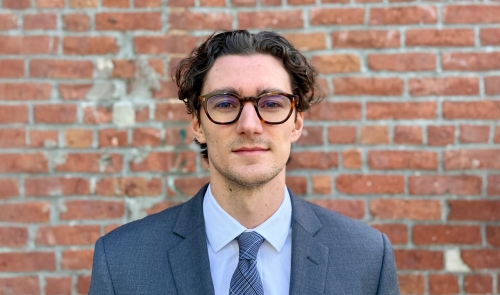Student Spotlight: Ian Pultz-Earle ’26

Ian Pultz-Earle ’26
Robert McKay Scholar
New York University Law Review, Online Editor
How did you decide to pursue law?
I have always been interested in how words and language affect the world around us, and also in debating policy solutions. I think law often sits at the intersection of those two concerns. In school, I was involved in debate and Model UN, which I learned were considered pre-law activities. In college, a friend and I took all the courses with “law” in the title and joked that we were the unofficial pre-law track. After college, I worked as a paralegal for two years to decide if I really wanted to go to law school. I think you can guess the answer.
You’re very involved in labor and employment law activities both at the Law School and externally. Why does that field interest you?
At a broad level, people spend a significant portion of their adult lives working, so the law that governs that aspect of life seems especially important. Growing up in Kansas, I saw the effects of limited labor protections and low union density and realized the importance of workers’ rights. When I moved to New York after college, I was inspired by the wave of union organizing and decided to get involved. I helped promote community support for unions on strike and pro-worker legislation. During this time, I met a lot of workers on picket lines, which helped convince me that pursuing labor law was the best way for me to help the labor movement.
Which Law School class or experience has had the biggest impact on you?
Legislation and the Regulatory State. I knew very little about administrative law before but loved the course. David Kamin [Charles L. Denison Professor of Law] did a great job of teaching and explaining the importance of administrative law in big policy debates. The course made me interested in legal policy work, which I am currently pursuing in the Regulatory Policy Clinic.
You are also working with Segal Family Professor of Regulatory Law and Policy Catherine Sharkey as a research assistant. Tell us about that experience.
Professor Sharkey was my professor for torts, which I really enjoyed and found fascinating. After developing an interest in administrative law, I talked to her about doing research. She had a project idea about judicial review of agency action. The project idea was still in its early stages, so I was able to participate in the substantive development of the argument, as well as conduct legal research.
Now we are co-authoring an article that looks at a recent challenge to Food and Drug Administration rulemaking and argues that courts should consider a different method of review in administrative cases, in light of Loper Bright [the Supreme Court case that overturned the Chevron doctrine of deference to governmental agencies]. Working with Professor Sharkey has been a great learning experience. She can clearly articulate complex ideas and knows how to organize them into effective written work, which is a skill I am always trying to develop.
What do you most like to do outside of class? What’s your favorite way to spend a day in New York City?
When the weather is nice, I love running and biking. One of my 1L section mates has become my running partner, and we have been using long runs as a way to explore different parts of the city. Recently, we ran all of Bedford Avenue, in Brooklyn. I spend a lot of time with my girlfriend, walking and Citibiking around Brooklyn. We enjoy trying new restaurants and are on a long-running search for the best tiramisu in the city.
Have you read any books or heard any podcasts lately that you would recommend?
My current go-to podcast is Odd Lots. It’s about finance and economics, but done in a fun and accessible way. A few months ago, they did a series on Eurodollars—US dollars created and used solely outside of the US—which was fascinating even though I didn’t fully understand it.

